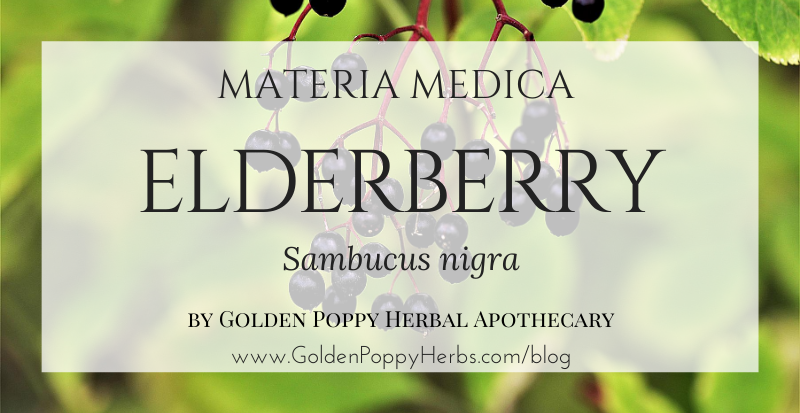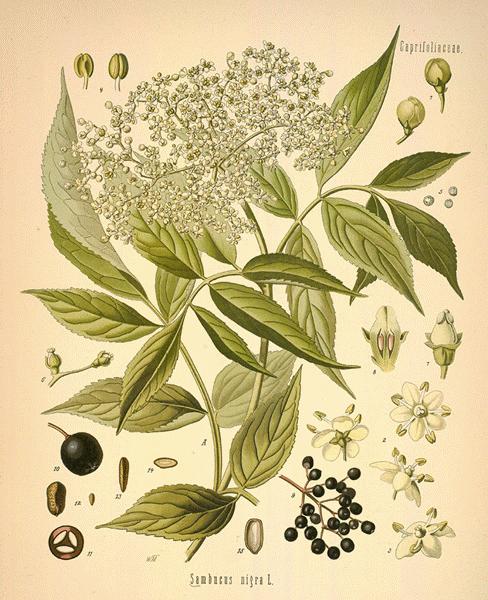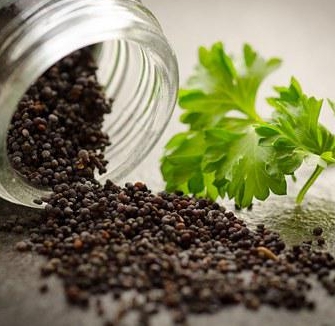High in vitamin C, quercetin, and bioflavonoids, elderberries may be small, but they carry an ancient reputation as mighty protectors. These glossy, jewel-like fruits have nourished and safeguarded people for centuries, weaving together nourishment, immune strength, and the simple delight of their tart-sweet flavor.
Traditional & Modern Uses
Elderberries are perhaps best known for their role as immune allies—called upon to strengthen the body during seasonal transitions. Taken daily, they can help fortify resilience, keeping colds and flus at bay. Their rich quercetin and bioflavonoid content also lends them an affinity for easing seasonal allergies, reducing inflammation, and soothing irritation in the respiratory system.
Modern research affirms what traditional herbalists have long known: elderberries contain compounds with antiviral activity, helping to shorten the duration and lessen the severity of colds, flus, and other viral infections such as herpes and hepatitis. Some studies show that symptoms may ease within 48 hours of use—a testament to elderberry’s quick-acting support.
Importantly, elderberries are considered safe for most ages, making them a beloved family remedy—perfect for the young, the elderly, and everyone in between.
MATERIA MEDICA: ELDERBERRY
Latin name: Sambucus nigra
Family: Caprifoliaceae (Honeysuckle family)
Parts Used: Primarily the berries, harvested in early fall. The flowers are also widely used, though with different qualities and applications (stay tuned for a future post!).
Energetics: Sweet, bitter, cool, moist
Actions: Alterative, anticatarrhal, anti-inflammatory, antispasmodic, antiviral, decongestant, digestive, nervine, rejuvenative, tonic
Uses
- Colds & flus
- Coughs
- Respiratory infections
- Immune support
- Minor constipation
- Rheumatism
Preparation & Dosage
Elderberries are most often enjoyed as syrups, tinctures, teas, and decoctions. Beyond their medicinal role, their rich, wine-dark flavor makes them a joy to incorporate into daily rituals.
- Tincture: 60–90 drops, 3–4 times daily
- Syrup or decoction: 1–3 teaspoons, 1–2 times daily
At Golden Poppy, we especially love our Elder Berry Immune Elixir—a delicious and traditional way to weave elderberry’s benefits into everyday life.
Berries vs. Flowers: Two Medicines from One Tree
One of elder’s gifts is that both its berries and flowers offer medicine—each with its own unique character.
- Elderberries are dense and nourishing, rich in flavonoids and antioxidants. They are cooling, moistening, and antiviral, making them especially helpful for immune resilience, flu prevention, and recovery. Their action is nutritive and building—strengthening the body over time.
- Elderflowers, in contrast, are light, airy, and outward-moving. Traditionally used in teas and infusions, they encourage gentle sweating, helping to break a fever or release heat from the body. The flowers are also diaphoretic, anticatarrhal, and soothing to hot, inflamed tissues, making them a classic remedy for colds, fevers, sinus congestion, and seasonal allergies. You can read more about the flowers specifically here: goldenpoppyherbs.com/elderflower-matieria-medica
Together, the berries and flowers create a holistic seasonal toolkit: the berries for long-term nourishment and antiviral strength, the flowers for acute relief when fevers or colds set in.
Cautions
While elderberries are generally safe, there are important distinctions and guidelines:
- Only black elder (Sambucus nigra) is safe for medicinal use. Other species, including red elder, are toxic.
- Raw berries, bark, leaves, and stems contain cyanogenic glycosides, which can cause nausea, vomiting, or diarrhea if not properly prepared. Always cook or dry berries thoroughly before use.
- Excessive syrup may cause digestive upset.
- Elderberry may lower blood pressure—use caution if taking antihypertensive medications.
- Avoid use in individuals allergic or hypersensitive to elder or other members of the Caprifoliaceae (honeysuckle) family.
Closing Thoughts
Elderberry is one of those herbs that feels like a true companion—tart yet sweet, strengthening yet gentle. It reminds us that sometimes the most profound medicine is not in exotic rarity, but in the simple, abundant gifts of nature. A daily spoonful of elderberry not only brings peace of mind, but connects us to the timeless practice of leaning on plants for seasonal resilience and care.
References
Herbal Academy. (n.d.). Elder monograph. The Herbarium, The Herbal Academy. Retrieved August 27, 2025, from https://herbarium.theherbalacademy.com/monograph/elder/




